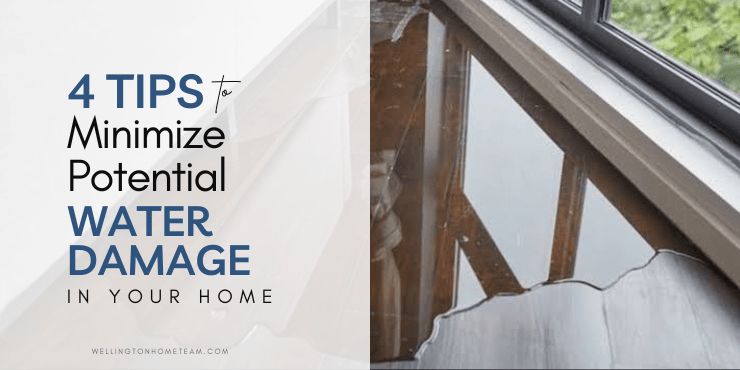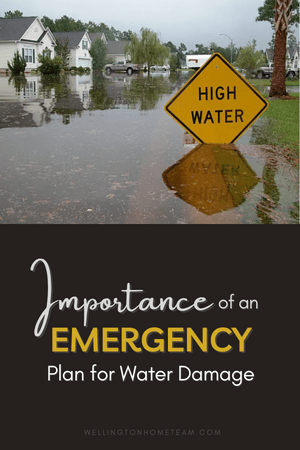4 Tips to Minimize Potential Water Damage in Your Home
Water damage is one of the most frequent home repairs and damages that most homeowners experience and frequently attempt to avoid. Unfortunately, some people might initially ignore it because it usually starts small. When overlooked, however, water damage can easily result in far worse damage to your property, necessitating more expensive repairs or even replacements.

Remember that not all-natural disasters, such as floods, persistent rain, or hurricanes, cause water damage. It often starts due to clogged gutters, small pipe holes, or improperly graded soil, all of which can be easily corrected when discovered beforehand. However, even a tiny amount of water can result in expensive damage, mold growth, or moist walls when ignored. Homeowners must spot any issues early for this reason.
The damage can be terrible, whether you have a catastrophic or minor, undiscovered water leak. Continue reading below as we discuss tips on how to minimize potential water damage in your home.
Tips to Minimize Potential Water Damage
Tip 1: Keep Your Gutters Clean
The first tip on how to minimize potential water damage to your home is to keep your gutters clean. Your gutters and downspouts are part of the pipe systems that hold water from your roof and make sure it moves away from the roof’s foundation, in addition to the concealed water pipes you already have in your home. The placement of gutters and downspouts outside, as opposed to other pipe systems, makes them simpler to maintain and control.
You must keep them free of any debris and other objects that can obstruct the path of the running water. Water can damage your home’s foundation by flowing toward it through clogged gutters. This is one of the many ways how to prevent water damage to foundation.
Additionally, water will probably go in the direction of your roof and result in roof leaks. As a result, be sure to clean your gutters and downspouts at least twice or three times per year. Important home maintenance procedures should not be neglected by a responsible owner.
Tip 2: Regularly Inspect Your Roof
The second tip on how to minimize potential water damage to your home is regularly inspect your roof. Leaky roofs are one of the most well-known causes of water damage. Your roof might leak for a variety of reasons. Defective roofing materials, improper installation, missing shingles, broken gutters, age, or unavoidable natural events like powerful storms and winds could all be to blame. You must periodically inspect your roof because of this. Your roof is the only part of your home that cannot be easily seen unless you purposefully check it with a ladder.
Roof issues frequently begin very slowly and go unnoticed until it’s too late. Some may even go undetected until your attic is completely flooded, or you may see thick moss growing on your roof, ceiling, or walls. The time it takes to conduct roof repairs and replacements, as well as their high cost, can interfere with your everyday activities.
By routinely inspecting your roof, you can avoid dealing with all that water damage, roof repair costs, and associated costs. This is one of the biggest ways how to protect your home from water damage.
Tip 3: Look for Areas with Mold
The third tip on how to minimize potential water damage to your home is to look for areas with mold. Mold or moss development in your wallpaper, ceiling, or painting is another common symptom of water damage. They frequently appear as a black, damp mark on your walls and have a musty odor, making the interior of your house unpleasant to live in. As a result, you must identify mold or mildew growth as soon as possible. Once you’ve done that, make sure to find the source of the moisture and address it as quickly as possible. Water doesn’t just appear in a home, there is always a source.
Tip 4: Set Up a Water Detection System
The forth tip on how to minimize potential water damage to your home is to set up a water detection system. Even though your home appears in decent condition, proactively checking for leaks is always advisable. Minor leaks can occur and go unnoticed for a long period of time, only to become apparent when the damage increases. It is, therefore, important to inspect your equipment, such as washing machines or dishwashers, for any indications of stray water. You can also look for any potential leaks in the bottom of your sinks.
Installing water detection devices in your home will significantly facilitate your search for water leaks. This device has an alert that sounds if it notices any dampness. You can put this close to your sinks, toilets, and sump pumps. When you are away from home, this device will also be useful.
The main water supply is promptly cut off as soon as the gadget notices any indications of a leak, protecting your house from further harm. This is one of the greatest water damage prevention tips and tools, that many people don’t even know about.
Water can easily cause damage to any home. However, there are steps that can be taken to minimize potential water damage, and here is how. #waterdamage #howtoImportance Of An Emergency Plan For Water Damage
In addition to learning how to minimize potential water damage, it’s always wise to have a water damage emergency plan in place for various reasons. Water damage can occur for a variety of reasons, including flooding, plumbing leaks, burst pipes, and natural disasters. Regardless of the origin, the repercussions can be severe, resulting in considerable financial loss, property damage, and potential health dangers. Here are the main reasons why having a water damage emergency plan is critical:
Reduce Property Damage
An effective emergency plan enables you to respond quickly and take appropriate action to reduce property damage. Knowing what measures to follow in the event of water damage allows you to solve the problem promptly and prevent further damage to your home or business.
 Ensure Safety
Ensure Safety
Water damage can jeopardize a building’s structural integrity, making it unsafe for residents. An emergency plan outlines safe evacuation procedures and ensures that everyone is informed of the possible hazards associated with water damage.
Prevent Mold and Mildew Growth
Excess moisture from water damage can promote the growth of mold and mildew, both of which can be harmful to one’s health. An emergency plan specifies the procedures that must be taken to remove standing water, dry impacted areas, and reduce the risk of mold growth.
Accelerate Insurance Claims
A well-documented emergency plan can help streamline the insurance claim procedure. By documenting every action and tracking the amount of water damage, you can provide insurers with the information they need to accelerate the claim settlement.
What Does Insurance Cover?
Coverage for Personal Property
If your possessions suffer damage from one of the risks covered by personal property coverage, it can help cover the cost of the damage. So, if a burst pipe results in a damaged computer or bookshelf, personal property coverage could assist with covering the cost of repair or replacement.
Remember that before your coverage begins, there may be a deductible. Also, there can be coverage constraints. To refresh your memory about the scope of coverage offered by your policy, read it. Your agent can assist you in modifying your coverage to suit your needs or provide information regarding your policy.
Dwelling Coverage
Dwelling coverage pays for damage to your home’s structure caused by a covered peril. As an example, if a pipe bursts unexpectedly and ruins a wall, dwelling coverage may help pay for repairs.
In addition, if water enters your home as a result of a roof leak caused by a covered risk such as a storm or fallen tree, your insurance policy may cover the cost of repairing the roof as well as any damage caused by the water.
Final Thoughts
Water damage may be harmful to your property in a variety of ways. Even minor leaks might cause key structural parts of your property to deteriorate. Following these tips for how to minimize potential water damage in your home will help you avoid water damage altogether.
Just remember water issues don’t resolve themselves, so never ignore one. It’s important you’re proactive in not only preventing water damage but resolving it as well. It’s also important for homeowners to understand their limitations, just because they learned how to prevent water leaks and minimize potential water damage doesn’t necessarily mean it will be prevented. Sometimes a professional needs to be called end. While it may be costly it will be a lot more costly, potentially financially devasting, by not doing so.
Please consider spreading the word and sharing; 4 Tips to Minimize Potential Water Damage in Your Home
Water can easily cause damage to any home. However, there are steps that can be taken to minimize potential water damage, and here is how. #waterdamage #howtoAbout the Author
Top Wellington Realtor, Michelle Gibson, wrote: “4 Tips to Minimize Potential Water Damage in Your Home”
Michelle has been specializing in residential real estate since 2001 throughout Wellington Florida and the surrounding area. Whether you’re looking to buy, sell or rent she will guide you through the entire real estate transaction. If you’re ready to put Michelle’s knowledge and expertise to work for you call or e-mail her today.
Areas of service include Wellington, Lake Worth, Royal Palm Beach, Boynton Beach, West Palm Beach, Loxahatchee, Greenacres, and more.
4 Tips to Minimize Potential Water Damage in Your Home

 Michelle Gibson of the Hansen Real Estate Group Inc is a full-time REALTOR who has been specializing in Wellington, Florida real estate since 2001. This veteran of the real estate industry has expertise in technology, marketing, and social media.
Michelle Gibson of the Hansen Real Estate Group Inc is a full-time REALTOR who has been specializing in Wellington, Florida real estate since 2001. This veteran of the real estate industry has expertise in technology, marketing, and social media.